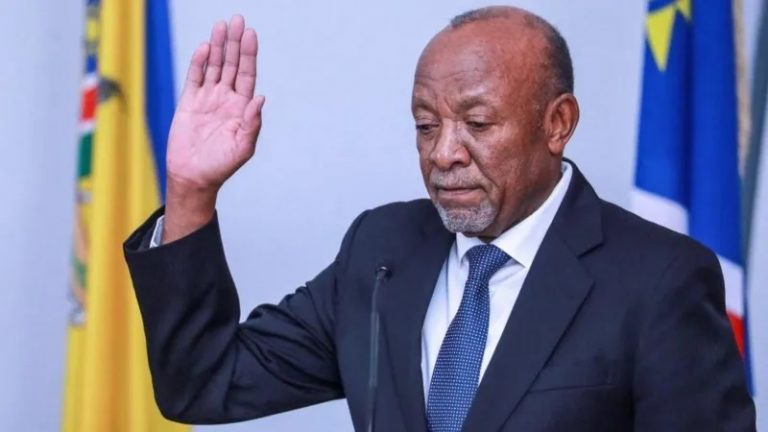
Namibia has witnessed a historic transition of power as Nangolo Mbumba was sworn in as the new President of the Republic, following the death of his predecessor Hage Geingob on Sunday morning. Mbumba, who was the Vice President under Geingob, took the oath of office at the State House in Windhoek, in front of dignitaries, officials and media.
Mbumba becomes the fourth President of Namibia since its independence from South Africa in 1990. He will serve until the next general elections scheduled for November this year. In his acceptance speech, Mbumba paid tribute to Geingob, who he described as a visionary leader and a chief architect of the Namibian Constitution.
”I accept with humility, the noble assignment bestowed upon me, that of appointment as the President of the Republic of Namibia, in accordance with Article 29 read together with Article 34 of the Namibian Constitution,” Mbumba said.
Register for Tekedia Mini-MBA edition 19 (Feb 9 – May 2, 2026): big discounts for early bird.
Tekedia AI in Business Masterclass opens registrations.
Join Tekedia Capital Syndicate and co-invest in great global startups.
Register for Tekedia AI Lab: From Technical Design to Deployment (next edition begins Jan 24 2026).
I take on this heavy mantle, cognizant of the weight of this responsibility, to serve all the People of the Republic of Namibia with utmost dedication and commitment, in the service of all citizens of the Namibian House.”
Mbumba also announced that he had appointed Netumbo Nandi-Ndaitwah, the Minister of International Relations and Cooperation, as his Vice President with immediate effect. Nandi-Ndaitwah is a veteran politician and diplomat who has served in various cabinet positions since 1990.
The swearing-in ceremony was held amid a national mourning period declared by Mbumba for seven days. Flags are flying at half-mast and public gatherings are limited to 50 people as a mark of respect for Geingob, who died at the age of 82 after a long battle with cancer.
Geingob was a towering figure in Namibian politics and history. He was one of the founding members of the ruling SWAPO party and a key negotiator for Namibia’s independence from South Africa’s apartheid regime. He served as the first Prime Minister of Namibia from 1990 to 2002, and again from 2012 to 2015. He was elected as President in 2015 and re-elected in 2019.
Geingob was widely praised for his role in promoting democracy, peace and stability in Namibia and beyond. He was also instrumental in advancing regional integration and cooperation through his chairmanship of the Southern African Development Community (SADC) and his involvement in various continental and global initiatives.
However, Geingob also faced challenges and criticisms during his tenure. He presided over a stagnant economy that was hit hard by droughts, Covid-19 pandemic and corruption scandals. He also faced growing discontent among some segments of the population, especially the youth, who demanded more social justice, accountability and inclusion.
Mbumba inherits a country that is still grappling with these issues, as well as the legacy of colonialism and apartheid that left deep scars on its society. He will have to balance continuity and change, as well as unity and diversity, as he leads Namibia towards its next phase of development.



